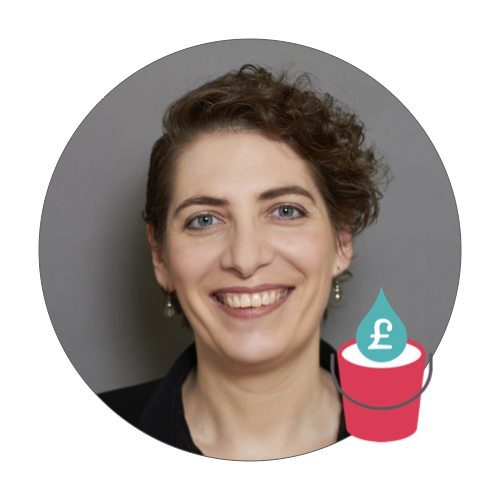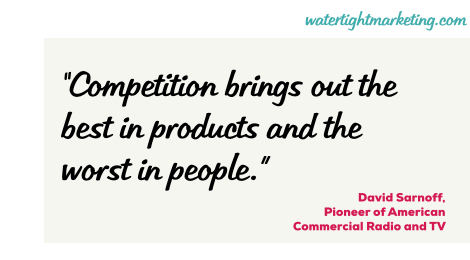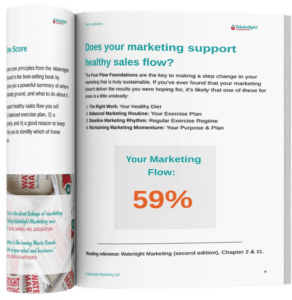Watching, tracking and reviewing what your competitors are up to could be classified as essential market research by some, or an irritating distraction by others. I’ve had a few discussions with clients in the last few days about whether or not to spend time looking at their competitors. And, I often have an internal discussion with myself about how much I should know or care about what others in my space are doing.
So, I asked my Twitter buddies what they thought, and got some really useful and interesting points of view. Here are the key themes of the discussion.
The time is better spent with like-minded or inspirational people
Interestingly, these two comments are both from accountants. Both of whom break the mould of their industry a bit. They both work within a geography, so it’s interesting to see that they take some inspiration from what people are doing further afield.
@bryonythomas I keep a vague eye on mine but mainly do my own thing, more interested in following good accountants in other regions.
— Della Hudson (@Hudsonaccountan) March 18, 2014
@bryonythomas No. Waste of time for me. Work differently than most locally. More interested in like minded people and sharing ideas
— Andrew (@ataccounting) March 18, 2014
The time is better used getting to know customers
I loved this response from Steve King. It’s refreshing to see this advice from a ‘numbers’ person. There’s so much in business books, and the like, about plotting yourself on competitor matrices, or competitive pricing. All of which is pretty sound advice, but this must surely be secondary to understanding your customers.
@bryonythomas A distraction (though not demotivating). Spend the time getting to know your customers better than your competitors.
— Stephen King (@steve_fworks) March 18, 2014
I’ve certainly seen businesses where the leaders seem to know everything about the competition, and very little about their customers. For me, if were an either / or choice as to where to focus energies – getting to know customers would win every time.
Collaboration is the best approach to competitors
Chris Budd made an excellent point here about reconsidering your own attitude to competitors. Joining forces can often increase your reach, and effectively remove competition.
@steve_fworks @bryonythomas Agree with Steve. Even better cd be to work with competitors – increase the size of the pie, not just your slice
— Chris Budd (@ovationchris) March 18, 2014
As Chris says, you can turn them into partners. A related point that I cover in Watertight Marketing is that having great relationships with competitors can be extremely beneficial. Even when it’s not possible to partner, having businesses that you can refer work onto is always a good idea. It means that you can say no to work that’s not quite right for your business with confidence and dignity. (See: How and when to say no to new business)
Handle competitor research with care
Some of the responses that made me think the most were those that focussed on how you respond to what you find out about your competitors. Neil Fletcher, who specialises in marketing for tech and engineering companies, made the point that you should know what your competitors are up to – but not so much that it becomes a distraction.
@bryonythomas Knowing what your competitors are doing is vital but should never distract from how your business runs.
— Neil J Fletcher (@ArrosamLtd) March 18, 2014
The response that made me think the most was from Paula White. She highlighted that it’s often the personality of the individual looking at competitors that determines the effect that it has. One person might find it inspiration and motivational – perhaps stepping up to the challenge set by others, or reassured by looking at a relative position. Another might find it saps their energy as they strive to ‘keep up with’ or emulate what others are doing.
@bryonythomas It’s absolutely both! How you deal with the information totally depends on your personality type. It can inspire or crush.
— Paula White (@paulawhite_uk) March 18, 2014
Then, I found this great quote – which I think really helps. I took it to mean that you would do well to benchmark your products, not your person.
“Competition brings out the best in products and the worst in people.” David Sarnoff, Pioneer of American Commercial Radio and TV
So, what do I think?
Well, I think my personality means that (mood dependent) I can certainly waste lot of time and emotional energy comparing myself to others, so it’s something I have to actively sit on my hands to avoid. But when it comes to ensuring my product offering hits the mark, I do benchmark pricing and benefits, and keep an eye on a few people I admire.
What about you? I’d love to know:
- Do you track competitors?
- Do you spend as much time researching customers?
- Do you find inspirational or demotivating?
© Bryony Thomas – The Watertight Marketer

Bryony Thomas
Author & Founder, Watertight Marketing
Bryony Thomas is the creator of the multi-award winning Watertight Marketing methodology, captured in her best-selling book of the same name. She is one of the UK's foremost marketing thinkers, featured by the likes of Forbes, The Guardian, Business Insider and many more, and in-demand speaker for business conferences, in-house sales days and high-level Board strategy days.



Identify a growing niche where you and your business can be seen as unique and #1 specialist in the eyes of your customers and prospects. You find those niches through market and customer insight, not by looking at competitors.
Thanks Mark. I completely agree. There’s a risk when looking at competitors that what you come up with a relative product – i.e. it is driven by its comparison. When you truly understand what customers want and need, you can develop something that’s driven by them.
Funnily enough Andrew and I follow each other so his comments made me smile.
I use Twitter to keep in touch with clients and other good accountants as well as other business partners and even a few friends. It really is just an extension of my face to face networking.
Most of my competitors aren’t on Twitter (in fact they’re not doing a lot of the things that I do) but I’m always looking for best practice and happy to adopt good ideas from other accountants and other professions.
It must be the sign of a great question if I’m still mulling it over a few days after the Twitter discussion!
My initial thoughts, and the blog post your question inspired http://arrosam.co.uk/so-what-about-your-competitors/, were informed by my personal history of selling tangible products with a small number of competitors. In some cases into very niche markets. Under these circumstances, you have to have a good idea of what your competition is doing in order not to be blindsided by them.
It seems from the tweets you received that the situation is somewhat different if one is selling intangible services and I’m now starting to recognise that. Under these circumstances, I can see the advantages of pretty much ignoring your competitors and ‘doing your own thing’.
For a start, the competitive base is likely to be large and, therefore, difficult to track. Also, your differentiation comes from what you deliver and how you deliver it. There is not the emphasis on ‘features and benefits’ that you see in a product-based environment.
In both scenarios, you need to have a broad understanding of your target market – who are they, how and why do they buy what you are offering – and you shouldn’t get too demotivated by the competition as it will always be there!
I guess the glib answer to your question is – it depends (as is so often the case.)
Thanks for poking my brain into action and for bringing me some insight!
Thank you Neil. Yes, it’s great to nudged into seeing things from a few different perspectives from time to time.